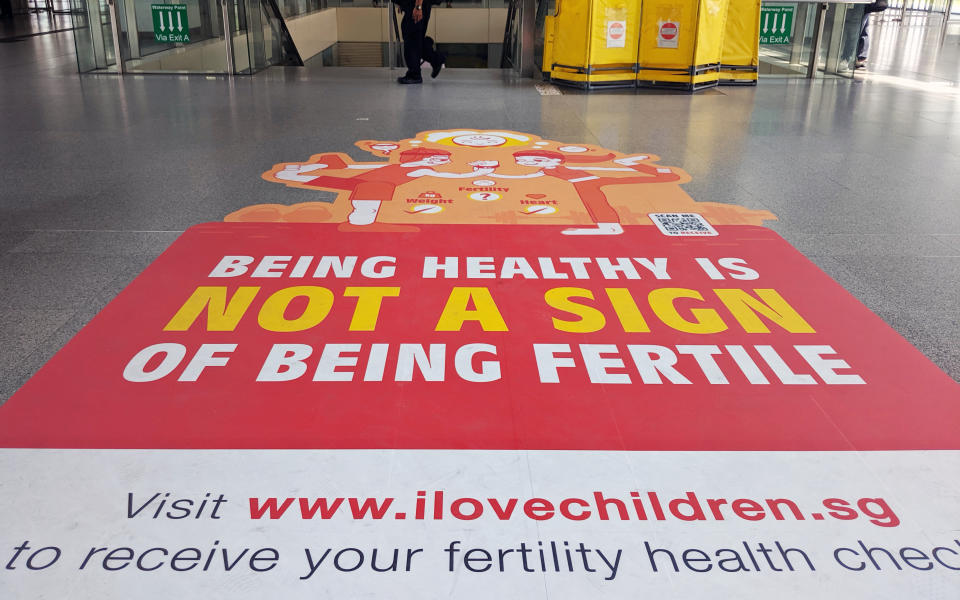40% of married Singaporean couples 'not happy' with progress in trying for a baby: survey

SINGAPORE — About 40 per cent of married Singaporean couples who are actively trying for a baby are “not happy” with their progress, according to a survey on fertility health.
Findings released on Thursday (4 July) also found that almost three in five respondents (58 per cent) - including couples who are dating, soon-to-wed and newly-wed - reported coming across people who have faced difficulties in conceiving their first or second child.
Almost three in five (58 per cent) were unaware of fertility health checks. A basic fertility health check includes an ultrasound scan and hormone blood test for egg reserves and ovulation, sperm analysis as well as a review of the results with a gynaecologist.
The street survey, commissioned by voluntary welfare organisation I Love Children (ILC), which advocates prioritising parenthood, polled 1,000 Singaporeans between April and May this year.
Four focus group discussions were also held with 10 doctors from both private and public hospitals in Singapore as well as 20 members of the public who were either dating or married.
The study is part of the ILC’s fertility awareness campaign this year. Among its initiatives are a roadshow, talks, and 200 fertility health check packages offered by Thomson Fertility Centre to selected married Singaporeans who only need to co-pay an administration fee of $30.
Five trains with key campaign visuals will also ply all operational MRT lines - North-South, East-West, North-East, Downtown, and Circle - in July.
The ILC broadly tackled obstacles to parenthood in three previous studies, held every two to three years, and this year’s survey is its first attempt at zooming into the issue of fertility health and its possible impact on Singapore’s total fertility rate (TFR), said Joni Ong, the organisation’s president.
Singapore’s TFR fell to an eight-year low of 1.14 last year.

The oft-cited obstacles to parenthood, such as finance and career, have been tackled by the organisation “for many years”, but according to Ong, “in the last four years, we felt that more and more, the lack of fertility health wellness in Singapore is a hole that can be plugged.
“(Based on previous studies and conversations), it sounds like people do not know about fertility before they embark on parenthood.”
For instance, Dr Tan Kai Lit, an obstetrician, gynaecologist and maternal fetal medicine clinician from Thomson’s Women’s Centre, noted couples that he sees are typically not aware of how much unprotected sexual intercourse is required to conceive.
“Some couples come to me after three months of trying and say they have difficulties in conceiving. But (they) should theoretically be trying out for a year and if they can’t get pregnant, that’s the definition of having difficulties in conceiving,” said Dr Tan.
To combat the lack of awareness, the ILC recommended introducing fertility health topics in talks and seminars at universities.
Businesses that provide goods and services to soon-to-weds and newly-weds could also consider bundling fertility health check packages with them and employers could also include them as part of employees’ benefits, it added.
Lack of awareness on ART and IVF
The study also found that 69 per cent of the respondents felt that infertility was treatable with the help of modern technology in assisted reproductive technologies (ART).
Assisted reproduction services in Singapore can only be provided to a married woman with the consent of her spouse. These include procedures such as in vitro fertilisation (IVF), intracytoplasmic sperm injection, and may involve the use of fertility medication.
However, only 27 per cent are aware that less than half of live births from ART are successful and the success rate decreases with age.
These findings are backed by focus group discussions with doctors, who noted that couples often have the misconception that IVF is a “magic bullet” in solving infertility issues, which is further perpetuated by the “constant media coverage of successful stories”.

This is also complicated by the fact that Singaporeans are marrying later - in 1980, the median age for grooms and brides was 26.7 and 23.6, respectively; by 2017, it was 30 and 28.4, according to government statistics.
With 77 per cent of newly-wed respondents expressing a desire to have a child within three years of marriage, this would mean most married women and men would consider conceiving at 31 or 33 years old, respectively, and may be “too late” in seeking medical attention, said the ILC.
The ages largely corresponded with observations by doctors in the focus groups: their patients are largely “aged 35 and creeping up”.
The study also found that about 40 per cent of respondents indicated they would consider going for a fertility health check, but only 21 per cent are willing to pay up to $399.
There are no fertility health check packages currently provided by public hospitals or polyclinics in Singapore, while the price per package ranges from $450 to $1,200 at private hospitals and clinics, said the ILC.
Public healthcare providers could look at introducing such packages, it noted.
At the same time, co-funding options for fertility health checks and ARTs could be extended to include qualified private clinics and centres, which can then match public hospital fees, it added.
The fertility checks could also potentially reveal underlying issues impeding pregnancy.
Cindy Ho, 32, a children’s worker at a church, went for fertility checks offered by the ILC last year, after trying for a baby for a few months with her husband Paulo Caperig, 31.
The tests detected a 10cm dermoid cyst in her right ovary. Left uncovered, it could lead to a risk of miscarriage.
Because the cyst presented no obvious symptoms, Ho said she could have easily gotten pregnant without ever finding out about it, potentially putting herself and her baby at risk.
Ho said she is going for checkups to assess her irregular periods. The couple are not giving up on setting up a family and they hope to have two children.
“We hear a lot of success stories from friends and media, and we had this impression that (conception) was very easy,” she quipped.
More Singapore stories:
Woodlands killings: Accused only regretted taking 'innocent' daughter's life
NUS Political Science Society pins blame on student for cancellation of 'model UN' conference
Cristiano Ronaldo dazzles crowd at Yumin Primary School with nifty football tricks


